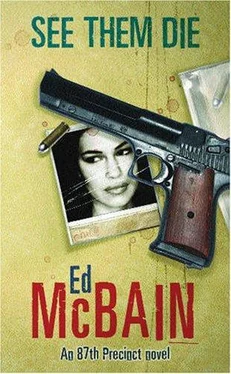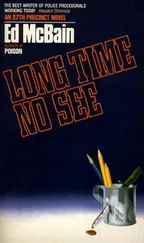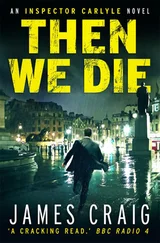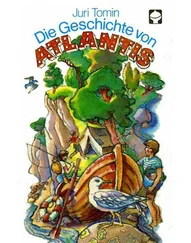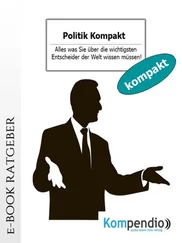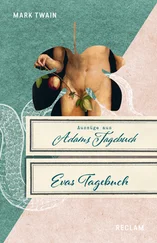Ed McBain - See Them Die
Здесь есть возможность читать онлайн «Ed McBain - See Them Die» весь текст электронной книги совершенно бесплатно (целиком полную версию без сокращений). В некоторых случаях можно слушать аудио, скачать через торрент в формате fb2 и присутствует краткое содержание. Жанр: Полицейский детектив, на английском языке. Описание произведения, (предисловие) а так же отзывы посетителей доступны на портале библиотеки ЛибКат.
- Название:See Them Die
- Автор:
- Жанр:
- Год:неизвестен
- ISBN:нет данных
- Рейтинг книги:5 / 5. Голосов: 1
-
Избранное:Добавить в избранное
- Отзывы:
-
Ваша оценка:
- 100
- 1
- 2
- 3
- 4
- 5
See Them Die: краткое содержание, описание и аннотация
Предлагаем к чтению аннотацию, описание, краткое содержание или предисловие (зависит от того, что написал сам автор книги «See Them Die»). Если вы не нашли необходимую информацию о книге — напишите в комментариях, мы постараемся отыскать её.
See Them Die — читать онлайн бесплатно полную книгу (весь текст) целиком
Ниже представлен текст книги, разбитый по страницам. Система сохранения места последней прочитанной страницы, позволяет с удобством читать онлайн бесплатно книгу «See Them Die», без необходимости каждый раз заново искать на чём Вы остановились. Поставьте закладку, и сможете в любой момент перейти на страницу, на которой закончили чтение.
Интервал:
Закладка:
Zip stifled a laugh and nudged Cooch in the ribs.
"Ten bucks says I know what he's looking for," Cooch said, grinning.
"Never mind what he's looking for. Go get Sixto and Papa.
Tell them I'm waiting, and tell them I'm getting slightly p.o.'d. Now move."
"Don't get excited," Cooch said, but he moved up the street quickly, passing the drunken sailor who had headed back towards the luncheonette. The sailor was in that sort of haze where everything seems to involve a decision meriting vast concentration and deliberation. He stopped at each building, studied the numerals, shook his head solemnly, and finally wound up in front of the luncheonette again, still shaking his head. He studied the sign, considered the vast symbolism in the words luis luncheonette, pondered this symbolism for a while, shook his head again, and was beginning to retrace his steps down the street when Zip said, "Help you, sailor?"
"Huh?" the sailor asked.
"You look lost," Zip said. His manner was quite pleasant. He grinned warmly and the sailor responded to the grin immediately, the lost wanderer accepting the first friendly hand.
"Listen," he said drunkenly, "where's La ... La Galli... La ... Listen, I was talking to a guy inna bar downtown, you know? An' we began discussin'..." He stopped and studied Zip with drunkenly profound narrowness. "Listen, how old are you?"
"Seventeen," Zip said.
"Oh."
The sailor tabulated this silently, his mind whirring. He nodded. "Okay, then. I didn't wanna impair the morals of a ... so this guy an' me, we were discussin' ... well, I was sorta expressin' my desire for sorta climbin' into bed with a female, you know? A girl. You know?"
"So he sent you up here?"
"Yeah. No. Yeah, yeah, he did. He said there was a place up here called ... ah... La Gallina." He pronounced the word with a Western twang that brought a new smile to Zip's mouth.
"La Gallina, yes," Zip said, giving it the proper Spanish pronunciation.
"Yeah," the sailor said, nodding, "where he said I could get anything I want. Now how about that?"
"He was right," Zip answered.
"So here I am," the sailor said. He paused. "Where is it?"
"Right down the street there."
"Thank you," the sailor said, nodding. "Thank you ver' much." He started off down the street again.
"Don't mention it," Zip said, smiling. He stared after the sailor for a few moments, and then went into the luncheonette. "Give me a cup of coffee, Luis," he said.
The sailor went down the street, studying each doorway as he had before. He stopped suddenly, looked at the lettering on the plate-glass window of a bar, and muttered, "La Gallina, I'll be damned. Feller was right." He walked directly to the front door, not expecting it to be locked, trying to open it, and then discovering that it was locked, immensely annoyed that the knob had resisted his hand. He backed away from the door and yelled, "Hey! Hey, wake up! Wake up, goddamnit! I'm here!"
"What the hell is that?" Luis said.
"Sailor out there," Zip said, grinning.
Luis came from behind the counter. Up the street, the sailor-was still shouting at the top of his lungs.
"You!" Luis said. "Quiet, quiet."
The sailor turned. "You talking to me, mate?"
"Si, I'm talking to you, mate. Stop the racket. This is Sunday morning. People like to sleep, you know? You wake them up."
"Well, hell, thass what I'm trying to do, you know."
"Why you trying to wake them up for?"
'"Cause I wanna go to bed."
"That makes sense, all right," Luis said, nodding patiently. "Are you drunk?"
"Me?" the sailor said. "Me?"
"Yes."
"Hell, no."
"You look perhaps a little drunk."
The sailor walked to where Luis was standing, put his hands on his hips and said, "Well, maybe I am perhaps a li'l drunk. So ain't you never been perhaps a li'l drunk?"
"I have been a little drunk," Luis said, "and I have been a lot drunk. Come. I'll make you a cup of coffee."
"Whuffor?"
"What for?" Luis shrugged and walked into the luncheonette. The sailor followed him. "Because I like sailors," Luis said. "I used to be a sailor myself once."
"Did you find it, pal?" Zip interrupted.
"Yeah. It's closed."
"I coulda told you that."
"So why dinn you?"
"You didn't ask."
"Oh, you're one of those guys," the sailor said.
"Which guys?" Zip asked, and he stiffened suddenly on the counter stool, as if expecting an attack.
"The guys you got to ask."
"Yeah," Zip answered. "I'm one of those guys. So what?"
Rapidly, perhaps because he sensed Zip's sudden belligerence, perhaps because he simply wanted to switch the conversation back to himself, Luis said, "Yes, I was in the Navy from 1923 to 1927. Yes, sir."
"Was you on a ship?" the sailor asked. If he had detected any challenge in Zip's voice, he was studiously ignoring it. Either that, or he was too drunk to have noticed.
"A man who has not been on a ship is not a sailor." He looked over at the bubbling Silexes. "The coffee is almost ready."
"What kind of a ship?"
"A garbage scow," Zip said quickly, and he grinned.
"Never mind this smart one. I was on a mine sweep."
"What was your rate?" the sailor asked suspiciously.
"You never heard of Rear Admiral Luis Amandez?" Zip asked, mock surprise spreading over his uneven features.
"I was a steward's mate," Luis answered with dignity. "And you shut up, you little snotnose."
"Wha'd he say your name was? Louise?"
"Yeah, that's right," Zip answered, chuckling. "This here is Aunt Louise."
"Louise? Yeah?"
"No, Luis. Luis."
"No, Louise," Zip insisted.
"Are you a Mexican, Louise?" the sailor asked.
"No." Luis shook his head. "Puerto Rican."
"Well, that's the same thing, ain't it?"
"Well" Luis thought for a moment, and then shrugged resignedly. "Si, the same thing."
"What part of Mehico you from?" the sailor asked obliviously.
"The part down in the Caribbean," Luis said dryly.
"The annex," Zip put in. "South. You know?"
"And whereabouts in Puerto Rico?"
"A town called Cabo Rojo, do you know it?"
"I only know Tia Juana," the sailor said, "and I ain't even been there. Closest I ever got was San Diego."
"Here," Luis said, pouring a cup of coffee. "Drink this."
"Where's mine?" Zip asked.
"I have only two hands." He finished pouring the sailor's coffee, and then poured a cup for Zip.
"What brung you all the way here from Puerto Rico?" the sailor asked.
"Work," Luis said. "A man has to work, you know."
"Where you from, sailor?" Zip asked.
"Fletcher," the sailor said. "That's in Colorado."
"I never heard of it."
"It's there, all right."
The three fell silent.
Zip and the sailor sipped at their coffee. Luis got to work behind the counter. There seemed to be nothing more to say to each other. The three, after all, had very little in common. One had inquired about the whereabouts of a bar-quasi-whorehouse. The other had told him where it was. The third had served them both coffee. One was in his early fifties, the other was perhaps twenty-two, and the third was seventeen. One was born in Puerto Rico, the other in Fletcher, Colorado, and the third was a native of the city. Thus divided by time and space and natural inclination, there was nothing each could say to the other at the moment, and so they fell silent.
And yet, within the silence, their thoughts ran in strangely similar patterns so that, if the thoughts had been voiced, each would have instantly understood or thought he'd understood the other.
Luis had begun thinking about why he'd come to the mainland, about why he'd left the place of his birth. He had told the sailor he had come here to work, and yet he knew it was something more than that. It was not to work, it was to begin. He had lived on the island with a wife and three children, and the island despite his love for it had meant primarily one thing, and that thing was hunger. Constant hunger. Hunger that lingered through the cane-cutting season because you could not spend all of your earnings while the season was in swing; you had to save some for the empty days ahead. There was not much to hold and not much to save. You fished in the off season, and sometimes your haul was good but most of the time you were hungry. And being hungry, even knowing that everyone else around you was hungry, being hungry somehow reduced you to being nothing. There were things he would always love about the island, the innate pride and decency and hospitality of the people, the respect humans automatically showed to other humans, a respect bred of sunshine and lush tropical foliage where cruelty seemed blatantly out of place. The island seemed to draw people closer together, strengthening their bonds as humans. And yet, contradicting this was the dire economic need, so that on the one hand Luis had felt like a very important person with many friends and much love, and on the other he had felt like a hungry animal.
Читать дальшеИнтервал:
Закладка:
Похожие книги на «See Them Die»
Представляем Вашему вниманию похожие книги на «See Them Die» списком для выбора. Мы отобрали схожую по названию и смыслу литературу в надежде предоставить читателям больше вариантов отыскать новые, интересные, ещё непрочитанные произведения.
Обсуждение, отзывы о книге «See Them Die» и просто собственные мнения читателей. Оставьте ваши комментарии, напишите, что Вы думаете о произведении, его смысле или главных героях. Укажите что конкретно понравилось, а что нет, и почему Вы так считаете.
